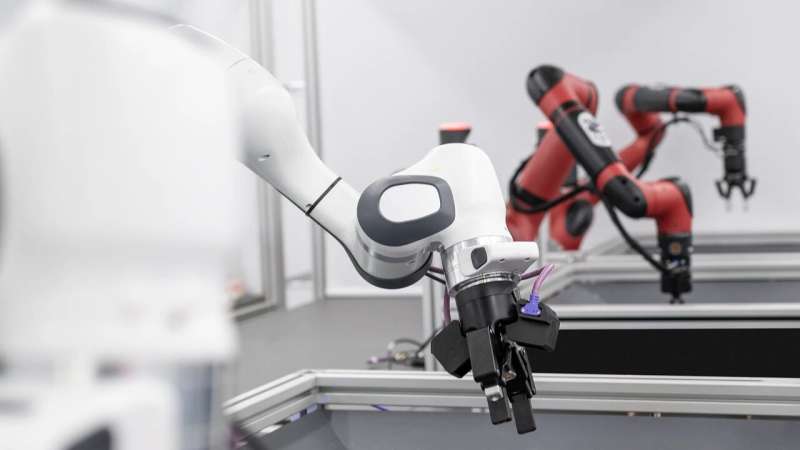June 26, 2023 report
This article has been reviewed according to Science X's editorial process and policies. Editors have highlighted the following attributes while ensuring the content's credibility:
fact-checked
preprint
trusted source
proofread
DeepMind unveils self-training RoboCat

An unknown admirer of felines once remarked, "Cats and computers both have one thing in common—they both rule the Internet."
At Google's DeepMind, researchers recently married artificial intelligence with a robot named RoboCat, and while it does not yet rule the Internet, it is expected to make a big leap into a future world of self-training automatons.
Utilizing the same technology behind large language models, the DeepMind team, comprised of more than 30 researchers, said it had made a breakthrough with a robotic cat that not only learns new tasks quickly but can improve its performance by constructing its own performance data.
"RoboCat has a virtuous cycle of training," DeepMind said in a paper published on the preprint server arXiv. "The more new tasks it learns, the better it gets at learning additional new tasks."
Up to now, robots generally have performed specific, pre-programmed tasks. With the introduction of large language models, robot skills sets began to broaden, though training on the massive volumes of data required enormous amounts of time.
DeepMind said Robocat, however, can quickly learn new tasks, such as fitting various-shaped puzzle pieces into the proper holes or placing fruit in a bowl. It then was able to progress and perform more complex tasks "based on a data set of millions of trajectories" from prior tasks and new self-generated data.
"These improvements were due to RoboCat's growing breadth of experience, similar to how people develop a more diverse range of skills as they deepen their learning in a given domain," researchers said.
As RoboCat improved its technique, its new learned behaviors were transferred to other robots that in turn built upon those skills.
The robot fine-tuned its performance on between 100 and 1,000 demonstrations from a human-controlled robotic arm. Spin-off models were then trained on specific tasks and that data was entered in the general instruction pool.
While RoboCat initially achieved a 36% success rate tackling tasks it had not previously learned, it improved its performance over time. Through self-training, its success rate doubled.
"RoboCat learns much faster than other state-of-the-art models," DeepMind researchers said. "It can pick up a new task with as few as 100 demonstrations because it draws from a large and diverse data set."
The development is seen as a major step towards accelerating robotics research, "as it reduces the need for human-supervised training, and is an important step towards creating a general-purpose robot."
The paper, "RoboCat: A Self-Improving Foundation Agent for Robotic Manipulation," was published June 20.
Will such robots eventually dispense with the need for human intervention?
That question was addressed 100 years ago in the 1921 play "R.U.R.: Rossum's Universal Robots," a tale by Czech writer Karel Čapek.
The play imagined a factory that created synthetic humanoids that worked continuously and eventually shrank labor costs by 80%. The word "robot" was used for the first time in this play, after the Czech word "robota," which meant "forced labor by serfs."
In the end, the robots rebelled and extinguished humanity.
RoboCats, we can hope, will be friendlier.
Though we must also remember what humorist Will Rogers once said: "Letting the cat out of the bag is a whole lot easier than putting it back in."
More information: Konstantinos Bousmalis et al, RoboCat: A Self-Improving Foundation Agent for Robotic Manipulation, arXiv (2023). DOI: 10.48550/arxiv.2306.11706
DeepMind: www.deepmind.com/blog/robocat- … roving-robotic-agent
© 2023 Science X Network


















